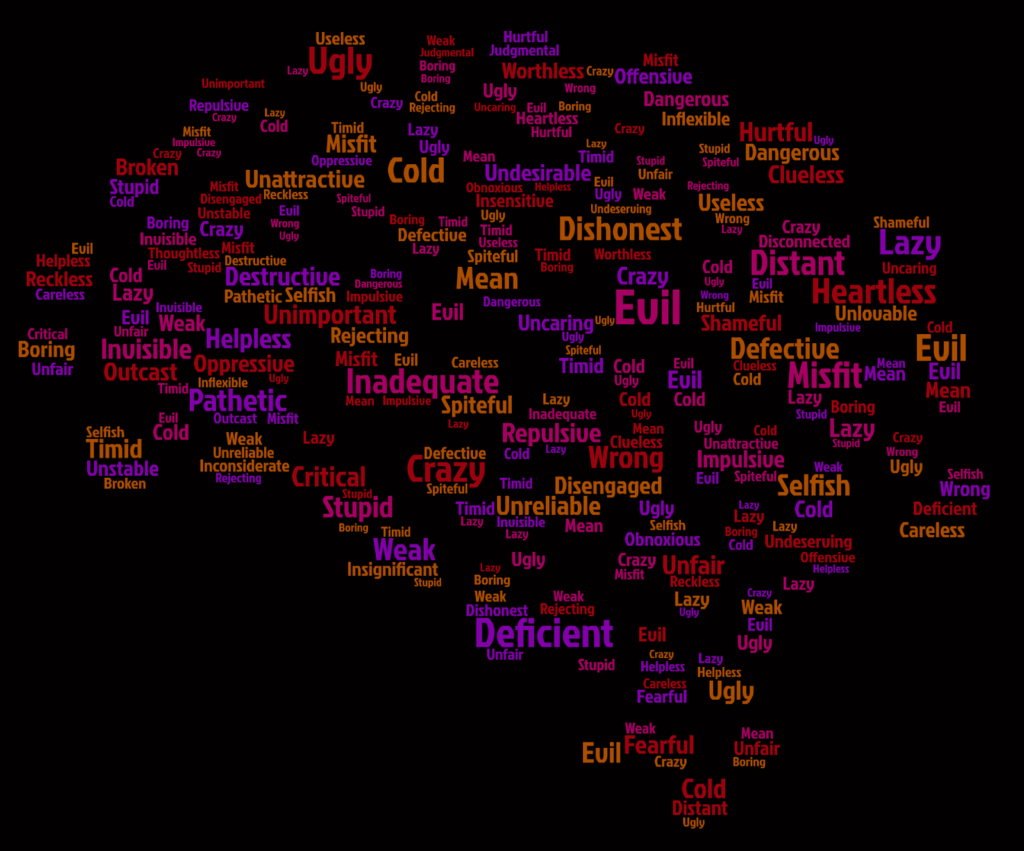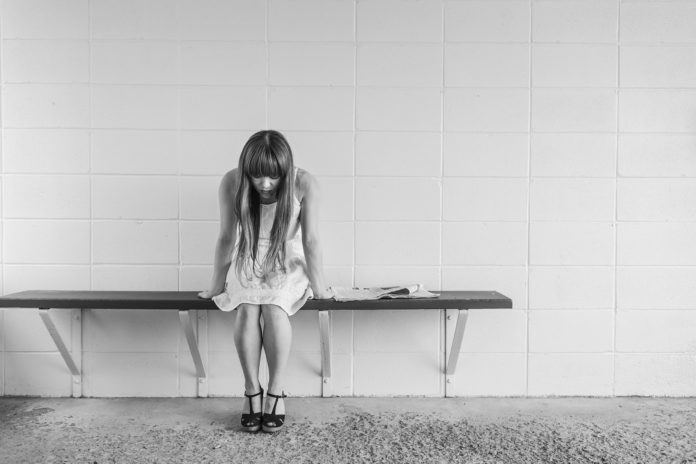Depression is an illness that is becoming increasingly common globally but few are willing to admit that he/she is suffering from it due to society viewing it as a taboo subject. It is a sickness that can affect anyone regardless of their age or circumstance. What is worse is that it can be difficult to tell if a person is dealing with mental illness just by looking at them. We have compiled a list that will help you recognize the signs of depression and tips on how to deal with it effectively.
*Disclaimer: you should always seek out professionals who specialize in dealing with mental health issues if you are suffering from severe depression.
1. Having Constant Negative Thoughts

You are frequently encouraged to have a positive outlook of life, to view a glass half empty as half full. Self-help gurus appear nightly on television, telling the audience how anyone can achieve their dreams by buying their latest book. Believing them, you go and buy yourself that self-help book, thinking that it will miraculously change your life after you have finished reading the last chapter. If only getting rid of negative thoughts was that easy.
The truth is that you need both positive and negative thoughts in your lives in order to balance ourselves. You need not treat negative thoughts as the villain because being concerned about the future can help you to be better prepared for possible pitfalls. The real problem is when you find ourselves constantly thinking only of negative outcomes. If this is true, then there is a good chance that you are suffering from some form of depression.
One way to tackle this is to become aware of your negative thoughts whenever they arise. Be curious about why you think the way you do and see how your thoughts shape your actions. The best thing you can do is to smile and wave goodbye to thoughts that do not serve your well-being.
2. Loss of Interest
You probably had instances where you were extremely excited about something only for your excitement to fizzle out after sometime. This is normal. What is not normal is having a complete lack of interest in various things, a condition called anhedonia. This can include not caring about your friends and family or suddenly withdrawing from activities that you once enjoyed.
It would be worth your while to find out whether you are suffering from anhedonia if you notice yourself frequently spacing out or abruptly withdrawing from activities that you once enjoyed. Anhedonia is a tricky condition to overcome and self-help solutions are not usually recommended. The best strategy would be to find a health care professional who specializes in mental health issues and obtain a proper diagnosis.
3. Feelings of Emptiness
You sense an absence of significance in your life, feeling troubled yet not truly miserable. You feel empty inside even when you are surrounded by people. This sensation creeps up time and time again, sometimes randomly, other times when you happen to compare yourself to others and wonder how their world is so perfect. If this is you, there is a good chance that you are suffering from depression.
Humans are social animals and interacting with others is a fundamental part of what it means to be human. You need people who can understand you and are willing to be there during the best and worst of time. Having 50 friends that you interact with superficially is incomparable to just having a handful of friends with whom you can share your most private thoughts. So go ahead and give your best friend(s) a call. You will be glad you did.
4. Insomnia
Have you been experiencing problems with your sleep lately? Sleeping is a fundamental requirement for us to feel physically and mentally fitter after finishing our daily work. A normal person requires between 7 and 8 hours of sleep a night to feel refreshed the next morning. Constant sleep deprivation can lead to numerous health issues including weight gain and cardiovascular illnesses. It could also mean that you are depressed.
Changes in sleep patterns are significant to note as they are a reflection of and affect our mental health. Insomnia can thus potentially make your depression feel worse. You should therefore take immediate action to address any sleep issues that you are experiencing because a prolonged lack of sleep will negatively impact your quality of life.
Most sleep problems usually go away on their own after making some notable lifestyle changes. Try adding a daily exercise routine, switching to a more nutritious diet, and distancing yourself from your gadgets before bedtime.
5. Low Self-esteem
Psychologist Abraham Maslow once constructed a hierarchy of needs placing self-esteem as the second most important human pursuit after self-actualization. It comes after one has satisfied his/her needs for basic survival needs such as food, shelter, and a sense of connection with others. Self-esteem consists of an internal component (feeling good about yourself) and an external component (being valued and recognized by others).
Causes of insecurity can range from past trauma to substance addiction to being a societal outcast just because you act differently. These wounds could be so deep that they can never completely heal. This, however, is not a reason to lose hope because regaining confidence starts with taking charge of your own life.
Start by having a profound discussion with yourself and writing down on a piece of paper identifying and categorizing the root causes of your low self-esteem. Be kind to yourself through self-forgiveness and consider each negative instance that you have encountered in your life to be a blessing in disguise. Do this exercise with as many bad experiences as you can think of over days, weeks, or even months because rebuilding/regaining your self-confidence takes time.
6. Changes in Appetite
You need to eat the right kind of food for your brain and body to function optimally. Yet, some people restrict their food intake because they want to emulate fashion magazine models while others overeat as a form of escapism from the pressures of everyday life. Neither approach is healthy or sustainable and could even be life-threatening. It is also a potential symptom of depression.
Eating healthy these days is easier said than done, but this does not mean you cannot formulate a plan to suit your needs. The general rule of thumb is to avoid eating highly processed food or eating them only sparingly and in small amounts. A diet consisting of mostly plants with some animal protein is a great starting point. Just keep in mind the acronym garbage in, garbage out (GIGO) every time that you put something into your mouth.
Lastly, approaching a licensed dietitian to help diagnose your eating disorders and get your eating habits back on track is an option you can explore should find yourself struggling.
7. Frequent Bouts of Irritability
Have you at times felt that even the least inconsequential thing gets on your nerves? When you feel negative about everything, it makes it easier for your surroundings to trigger a sense of irritability within. This sense of irritability usually leads to anger and frustration which could in-turn lead to a vicious cycle of never-ending complaints.
The solution is to practice patience and acceptance. This is where you learn how to control your emotions and responses. Slow down and examine what is bothering you throughout the day. If it is something external, ask yourself how much control you have over them. You can tackle the issue head-on or, if it is beyond your influence, accept it and move on.
If the causes of your irritations are internal, take some time out and evaluate. Ask yourself what you can do about it. Are your thoughts based on facts? Are these facts or are they figments of your imagination? You can usually change how you feel and react to things that are internal much better than the external.
Allow yourself to be grounded by creating a sense of inward tranquility as often as possible. Some issues will undoubtedly remain regardless of how you tackle things but being grounded means that you can better deal with any disturbance that appears.
8. Sense of Helplessness
You likely have given up at one point or another in your life because you felt helpless about a particular situation. This could be something like someone broke into your house or having to deal with toxic colleagues at the workplace. You felt paralyzed and decided that the best course of action was to withdraw from any sort of engagement.
“The default position of the brain is to assume that stress is not controllable,” said Steven F. Maier, PhD., one of the researchers involved in a study about ‘learned helplessness’. The study uncovered that the real issue when it comes to helplessness is in fact a lack of control of your responses.
What does this imply? It means that you can control helplessness by being aware of your situation and taking charge of how you respond. Study the problem that you are facing and brainstorm possible solutions. For example, if you do not like the toxic workplace, you can file a complaint to senior management, ask to be switched to another department, or look for another job.
Talk with your close friends and family about the issues that you are facing instead of burying them inside. Be comfortable with feeling vulnerable because these feelings – like the pressure inside a pressure cooker – needs a release valve. You are more adept at dealing with adversity than you realize.
You Must Believe That You Can Overcome Depression
Do not despair if you find yourself showing some or even all the signs of depression above because it ultimately boils down to the severity of the depression. There is no shame in seeking the help of a medical professional who may prescribe medications as part of your treatment if you feel that your situation has not improved after some time. Sweeping the problem under the rug and hoping that it will go away on its own is a self-sabotaging and destructive behavior. Instead, you need to develop the courage to tackle depression if you want to live a happier, more fulfilling life.
We wish you all the best.




